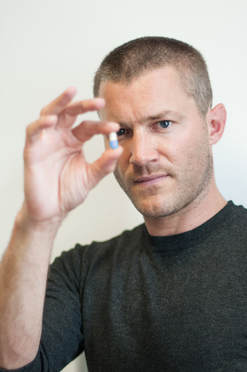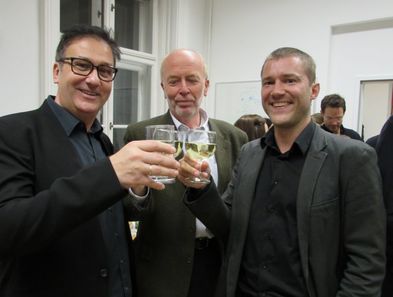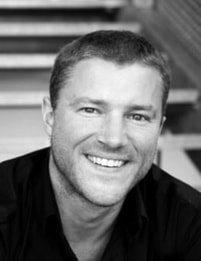After his graduation with a PhD in neuroscience in 2009, Chris applied for a one-year early-stage career post-doctoral fellowship from the Swiss National Science Foundation (SNSF), which he was awarded in...
|
After his graduation with a PhD in neuroscience in 2009, Chris applied for a one-year early-stage career post-doctoral fellowship from the Swiss National Science Foundation (SNSF), which he was awarded in 2010. After a one-year postdoc at the Economics Department in Zürich, Chris then moved to Cambridge, UK, to work with Trevor Robbins as a visiting postdoctoral scholar at the Behavioural and Clinical Neuroscience Institute. Here he could deepen his knowledge and skills in psychopharmacology. He performed research on the role of the dopamine D2/D3 receptor antagonist sulpiride on human reward processing and prosocial behaviour. To continue his research with Trevor Robbins, Chris applied for a two-year advanced SNSF fellowship, which he was awarded in 2011.
|
|
|
In December 2013, Chris received a highly competitive “Vienna Research Group for Young Investigators” grant from the Vienna Science and Technology Fund (WWTF) to start up his own research group in Vienna. The funding volume of € 1.5 M. allowed him to establish the “Neuropsychopharmacology and Biopsychology Unit” (NBU). He was promoted Assistant Professor in August 2014.
With his team, Chris set out to combine methods from behavioral economics and neuropsychopharmacology with computational modelling, with the ultimate goal to better understand the neurobiology of complex social behaviors such as trust, competition, cooperation, or our tendency to conform to others’ actions. |
|

Research interests and contributions During his career, Chris made significant contributions to several research areas. Many of these emerged from the large number of successful and often long-lasting research collaborations that Chris established. His in-depth knowledge of both pharmacology and neuroeconomics, and his extensive network of collaborators enabled him to bridge different fields in his research, which helped him to live out his many research interests and ideas. A highlight of Chris’ PhD was his experiment on the role of testosterone in economic bargaining behavior. He conducted this study together with his officemate Michael Naef, with whom he would continue to closely collaborate in the years after. The major innovation of this project was to combine testosterone administration with explicit belief assessments in a well-tested behavioral economic paradigm. This revealed an intriguing dissociation between folk beliefs about the hormone and its actual effects on behaviour. Specifically, individuals believing that they had been given testosterone showed less fair bargaining offers, reflecting the stereotypical belief that testosterone promotes aggression. In contrast, the hormone’s actual effect was that it increased the fairness of offers. These findings, which were published in Nature in 2010 (1), were pivotal in changing the way we think about testosterone, which can, depending on the social context, produce prosocial rather than aggression-related effects. 
During his time at Cambridge University, Chris started working with Luke Clark (Cambridge University) and Ulrich Müller (Cambridge University) on the role of the dopamine system in reinforcement learning and executive functioning. With Daria Knoch (University of Bern) and Jörg Rieskamp (University of Basel), Chris investigated the effects of dopamine on belief updating and reward processing in social environments. He was among the first researchers to combine psychopharmacology and genetics to gain an in-depth understanding of dopamine function at the receptor level, and how this ultimately affects human decision making (2). The pharmacogenetic approach proposed in that work motivated similar research on decision making and memory during his fellowship at Cambridge University. In 2013, Chris was the first to show how dopamine influences belief updating about others’ trustworthiness, in a repeated dynamic interaction paradigm (3), A major innovation of this work was the combination of psychopharmacology and mathematical modeling to assess the causal role of the dopaminergic system in belief updating about others’ trustworthiness. This triggered additional research, including work on the role of dopamine D2 receptors in human reinforcement learning. Here, Chris combined administration of the selective dopamine D2/3-receptor antagonist sulpiride with genetic analysis of the dopamine D2 receptor, and demonstrated that this receptor seems to have a causal role in choice performance, which is distinct from learning. These findings challenged classic reward prediction error models of reinforcement learning, and instead suggested a role of postsynaptic dopamine D2 receptors in motivational aspects of reinforcement learning (4).
With Jack van Honk (University of Utrecht and University of Cape Town), Chris engaged in research in a unique group of individuals: patients suffering from Urbach-Wiethe disease, a genetic disorder which involves selective lesions of the basolateral amygdala. They discovered that, compared to healthy controls, these patients showed an almost 100% increase of trusting decisions (5). Strikingly, the lesion did not affect the patients’ explicit beliefs about others’ trustworthiness. This research, which involved challenging field work in South-Africa which Chris greatly enjoyed, initiated several follow-up studies, including experiments which are currently being continued by members of his lab. |
|
|
With Ernst Fehr, Chris continued his research on testosterone, implicit status seeking, and competition. Based on that work, he was invited by TiCS in 2011 to write a review (6) on the role of testosterone in human social behavior, in which he explored how the hormone´s role in promoting status seeking might relate to other findings in the social domain (such as reducing trust or promoting competitiveness). This review was received very well, and inspired Chris to engage in follow-up research highlighting the crucial role of implicit beliefs about status in explaining how hormones such as testosterone shape social behavior. He pursued his research line on testosterone both in his own research group in Vienna, and in collaborations with colleagues abroad, including Jack van Honk (7) , Robert Kumsta (Bochum University; 8), and Luke Clark and Yin Wu (Shenzhen University, China; 9, 10, 11, 12).
|
|

With Boris Quednow (University of Zurich), Chris carried out several studies on social-cognitive deficits in cocaine-addicted individuals (13, 14, 15). They also did research on the social-cognitive and neuroendocrine effects of gamma-hydroxybutyrate (GHB; 16). Furthermore, Chris was involved in research on the effects of 3,4-Methylenedioxymethamphetamine (MDMA, commonly known as ecstasy) on social decision making and affect (17).
After Chris had moved to Vienna, he collaborated with Claus Lamm (University of Vienna), on a project about the role of the opioid system in empathy for pain, a research line which would become very successful (18). He also conducted research with Igor Riečanský (University of Bratislava and University of Vienna) and Gerhard Jocham (Magdeburg University) on the effects of estradiol on fear, reinforcement learning and delay discounting. Only recently, he had started a promising collaboration with Giorgia Silani (University of Vienna) and Matthäus Willeit (Medical University of Vienna) on a WWTF-funded project about the neurochemical and neurocognitive basis of primary and social reward in humans, on which he was co-PI. |
|

Besides his conceptual work, Chris had a keen interest in developing and applying new research methods and measures, and these contributions have had a substantial impact as well. For instance, his work on the pharmacokinetics of testosterone and estradiol gel (19) has been widely used to inform new studies in which these hormones were administered.
The Neuropsychopharmacology and Biopsychology Unit (NBU) With his newly-founded research group the NBU, the core question Chris set out to address was how the human brain enables us to meet the challenges of navigating an ever-changing social environment. One key aspect that allows for the short-term flexibility we show in our social interactions is our ability to constantly update beliefs about others, and to change our behavior in line with those updates. For instance, unreciprocated trust may change our beliefs about the trustworthiness of a business partner, and feedback about prevailing social norms may change what we consider to be a socially appropriate action. Social feedback can also affect the beliefs about one’s social standing, and change whether we engage in further status competition. By focusing on the role of neurotransmitters and neuroendocrine systems in enabling such flexibility, and seeing the added value of computational modelling approaches, Chris took a truly renewing approach to tackling the question of how we ultimately deal with change. Together with his lab members, he had designed a variety of clever experiments to shed light on these bigger questions, and he was well on his way to pick the fruits from his hard work. Besides, he had engaged in many promising collaborations with other researchers in and outside of Vienna. Chris’ group members at the NBU are dedicated to continuing the work that he started with them, inspired by his curiosity and love for science, and encouraged by everything they have learned from him. The team also receives generous scientific support from several of Chris’ friends and collaborators (most notably Claus Lamm, Michael Naef, and Jack van Honk), as well as continued financial support from the WWTF.
We remember Chris as a bright, curious and truly creative scientist, whose work was of great value for the research field (even though he would unassumingly describe himself as “Ottonormalverbraucher” (“Average Joe”)) - and who was well on his way to further increase this impact, brimming as he was with new and promising research ideas. But first and foremost we remember him as the amazingly warm, soulful and authentic person he was - full of humour, ideas, and genuine interest in others, and with a sparkling, untamed joy of life. He is dearly missed.
|
|
Guestbook
(Click memories to expand)


